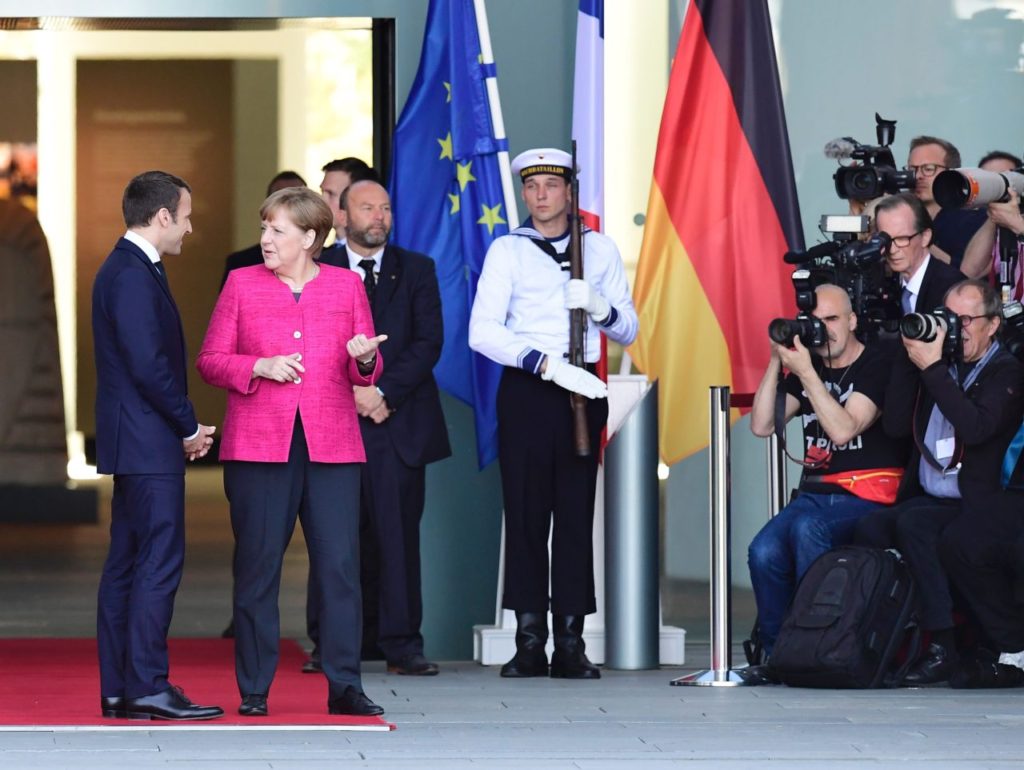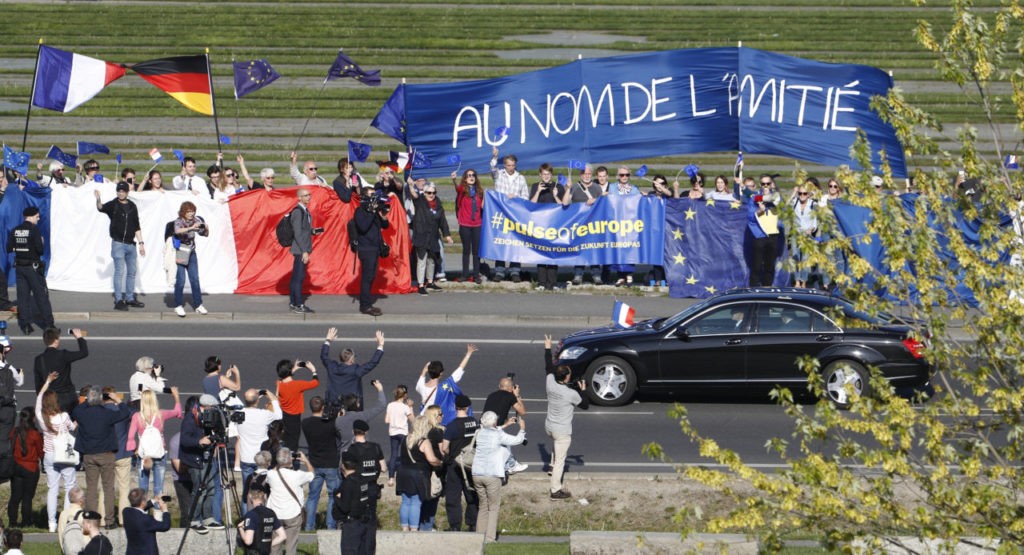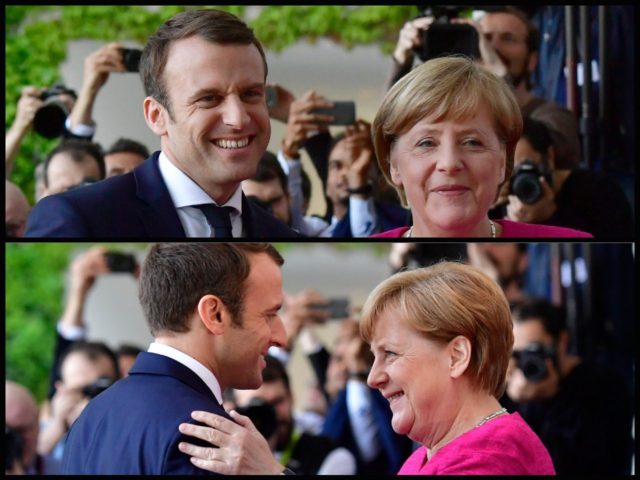BERLIN (AP) — French President Emmanuel Macron met with German Chancellor Angela Merkel in Berlin on Monday, being greeted on a red carpet outside the chancellery with military honors on a busy first full day in office that started with his naming 46-year-old lawmaker Edouard Philippe as his new prime minister.
Appointing Philippe to the top job in his government ticked several boxes for Macron, at 39 France’s youngest president, who took power on Sunday.
Philippe’s age reinforced the generational shift in France’s corridors of power and the image of youthful vigor that Macron is cultivating. Philippe is also relatively unknown to voters, fulfilling Macron’s campaign promise to repopulate French politics with new faces.

German Chancellor Angela Merkel greets French President Emmanuel Macron (L) prior talks on May 15, 2017 at the chancellery in Berlin, one day after the new French president took office. (TOBIAS SCHWARZ/AFP/Getty)
Philippe is the mayor of the Normandy port of Le Havre, a trained lawyer and an author of political thrillers. His appointment marks a milestone in the rebuilding of France’s political landscape, which has been dynamited by the election of Macron — the first president of modern France not from the country’s mainstream left or right parties.
Philippe is a member of the mainstream-right Republicans party. As such, Philippe could possibly attract other Republicans to Macron’s cause, as the centrist president works to piece together a majority in parliament to pass his promised economic reforms.
Alain Juppe, a former French prime minister, called Philippe “a man of great talent” with “all the qualities to handle the difficult job.”
Shortly after the announcement, Macron flew to Berlin, continuing a tradition of French presidents making their first foreign trip to Germany.
A large group of onlookers, some carrying European flags, stood outside the chancellery as Macron arrived.
Germany and France have traditionally been the motor of European integration, but the relationship has become increasingly lopsided over recent years as France struggled economically.
The visit signaled his intentions to move rapidly on campaign promises to revive support for the beleaguered European Union by reforming and strengthening it.
Speed is becoming one of Macron’s trademarks. Including the “thank you” at the end, the announcement of Philippe’s appointment, delivered by the presidency’s new secretary general , took just eight seconds.
As well as the political coup of poaching Philippe from the right, Macron is also siphoning off support from lawmakers on the left. At least 24 Socialists are now campaigning for re-election under the banner of Macron’s Republic on the Move party.
But not everyone was pleased with Philippe’s announcement.
For far-right leader Marine Le Pen, Macron’s rival for the presidency, the selection of Philippe reflects a continuation of the system she hoped to break.
“This is the sacred alliance of the old right and left, united in their wish to remain in place at any price,” Le Pen said in a statement. Defeated by a Macron landslide, she denounced what she predicted would be a continuation of old policies, including “austerity, submission to Brussels, massive immigration.”
The populist Le Pen said her National Front party is now the only “true opposition” for June legislative elections.
French far-left leader Jean-Luc Melenchon, who won nearly 20 percent of the vote in the first round of the presidential election, also reacted with hostility.
Voters go to polls again in June to elect 577 National Assembly lawmakers. Melenchon urged them not to give Macron a parliamentary majority.
“The right has just been annexed, with a prime minister taken from its ranks, from the Republicans,” Melenchon said. “Don’t give full powers to Mr. Macron and his prime minister.”
Macron’s trip to Berlin highlighted his pro-European politics and desire to work with Merkel on what he says must become “a more efficient Europe, a more democratic Europe, a more political Europe.” Macron previously met Merkel when he visited Berlin in March as a candidate.
Germany is looking to Macron to revitalize France as an economic power and political heavyweight in the EU, which is facing complex divorce proceedings with its current No. 2 economy, Britain.
When Britain leaves the bloc in 2019, France will be the EU’s only member with nuclear weapons and a permanent seat on the U.N. Security Council.

Supporters of the “Pulse of Europe” movement rally during the arrival of French President Emmanuel Macron for talks on strengthening the EU, a day after the new French president took office on May 15, 2017 at the chancellery in Berlin. (ODD ANDERSEN/AFP/Getty)
As a candidate, Macron called for a “new Franco-German deal” that would involve “much more structured cooperation” on investment, on European border security, and on defense.
Macron is the conservative Merkel’s fourth French president in nearly 12 years as chancellor. She built a solid relationship with Macron’s predecessor, Socialist Francois Hollande, despite their political differences — notably with their joint effort to secure an accord to calm the fighting in eastern Ukraine in tense talks in Minsk, Belarus in 2015.
Germany is keen to continue the Franco-German diplomatic drive to keep a lid on the situation in Ukraine, where Russia-backed separatists are battling the government.
Merkel has praised Macron’s embrace of European unity but has offered few concrete details about the way forward for German-French relations.


COMMENTS
Please let us know if you're having issues with commenting.